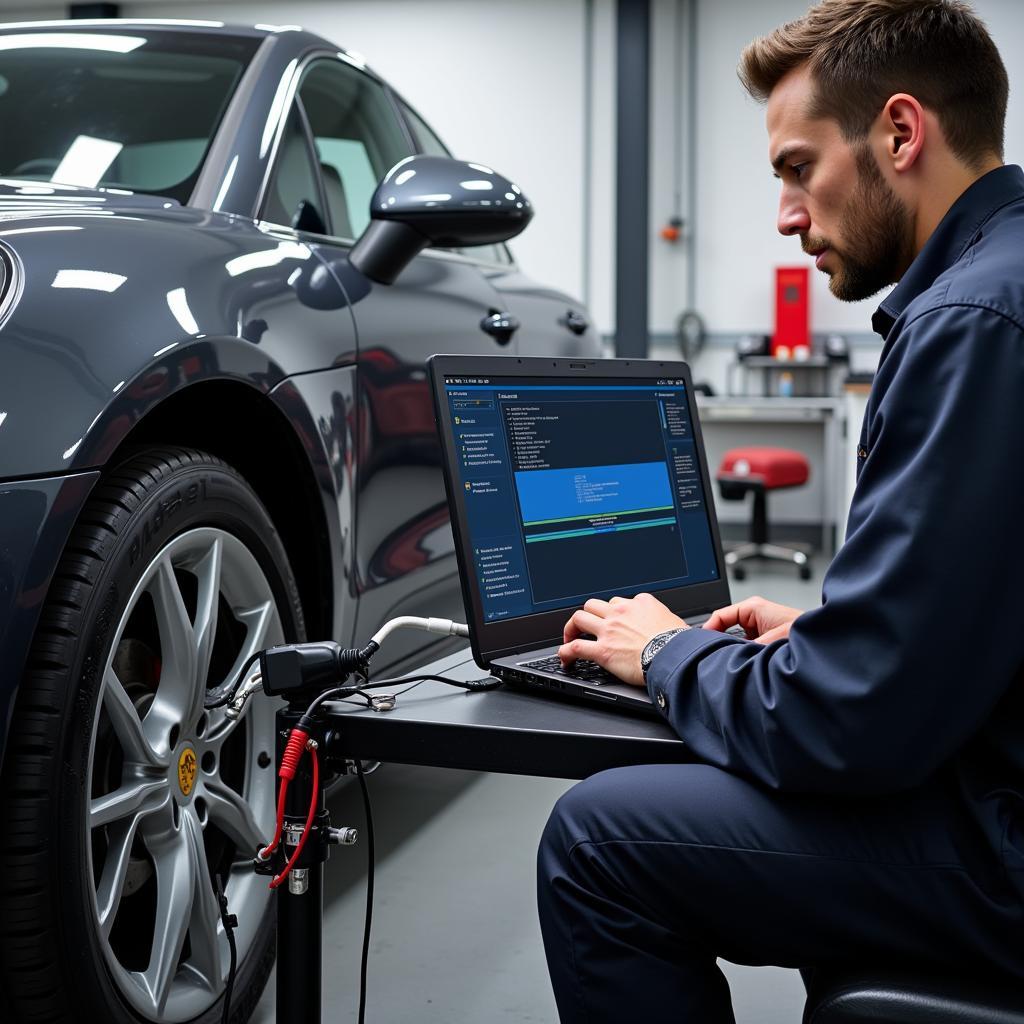Owning a Porsche 996 is a dream come true for many car enthusiasts. However, like any high-performance machine, it requires specialized care and maintenance. When issues arise, a Porsche 996 diagnostic tool can be your best friend, allowing you to identify and potentially fix problems yourself. This comprehensive guide explores the world of Porsche 996 diagnostic tools, empowering you to take control of your car’s health.
Understanding the Importance of a Porsche 996 Diagnostic Tool
Before delving into the specifics of diagnostic tools, it’s crucial to understand their significance, especially for a car as technologically advanced as the Porsche 996. Unlike older vehicles with simpler mechanical systems, the 996 heavily relies on electronics and computer modules. These modules control everything from engine performance and transmission shifting to airbag deployment and climate control.
When a problem occurs, the car’s onboard computer system stores a Diagnostic Trouble Code (DTC) related to the malfunction. A Porsche 996 diagnostic tool allows you to access and interpret these codes, providing valuable insights into the root cause of the issue. This eliminates guesswork, saves you time and money on unnecessary repairs, and puts you in the driver’s seat when it comes to your 996’s maintenance.
Types of Porsche 996 Diagnostic Tools
The market offers a wide array of Porsche 996 diagnostic tools, each with varying capabilities and price points. Choosing the right one depends on your technical expertise and the depth of diagnosis you require. Let’s break down the most common types:
1. Basic Code Readers
As the name suggests, basic code readers offer the most fundamental functionality – reading and clearing DTCs. They are generally affordable and user-friendly, making them suitable for car owners who want to perform simple diagnostics and troubleshooting.
2. Advanced OBD-II Scanners
These scanners provide more in-depth information than basic code readers. They can access live data streams from various sensors, display real-time engine parameters, and offer some bi-directional control capabilities. Advanced OBD-II scanners are ideal for DIY enthusiasts who want to delve deeper into their 996’s systems.
3. Porsche-Specific Scanners
For the most comprehensive diagnostics and advanced functionalities, Porsche-specific scanners are the ultimate tools. These scanners are specifically designed to communicate with the intricate systems of Porsche vehicles, including the 996. They offer the most accurate and detailed information, allowing you to perform complex procedures like module coding, adaptations, and programming.
“Investing in a high-quality Porsche-specific scanner is essential for any serious 996 owner. It’s the closest you can get to having a Porsche technician in your garage.” – John Miller, Senior Porsche Technician at Cardiagtech.
Choosing the Right Diagnostic Tool for You
With so many options available, selecting the right Porsche 996 diagnostic tool can seem overwhelming. Here are some key factors to consider:
- Your Budget: Determine how much you’re willing to invest, keeping in mind that more advanced features often come with a higher price tag.
- Your Technical Skills: Assess your comfort level with automotive technology. If you’re a beginner, a basic code reader might suffice. However, if you’re more experienced, consider an advanced OBD-II scanner or even a Porsche-specific scanner.
- Your Diagnostic Needs: Do you primarily need to read and clear codes, or are you interested in accessing live data, performing adaptations, or coding modules?
- Software Updates: Ensure the tool you choose offers regular software updates to stay compatible with the latest vehicle models and technologies.
Conclusion
A Porsche 996 diagnostic tool is an invaluable asset for any owner who wants to understand and maintain their car’s health. By investing in the right tool and utilizing the information it provides, you can save time, money, and frustration in the long run. Remember to choose a tool that aligns with your budget, technical skills, and diagnostic needs.
Need expert assistance with your Porsche 996 diagnostics or repairs? Contact CARDIAGTECH today at +1 (641) 206-8880 or email us at CARDIAGTECH[email protected]. Our team of experienced technicians is ready to assist you at our workshop located at 276 Reock St, City of Orange, NJ 07050, United States.
FAQs
1. Can I use any OBD-II scanner on my Porsche 996?
While a generic OBD-II scanner might read basic engine codes, it won’t offer access to all the modules and functionalities within the Porsche 996’s system. For comprehensive diagnostics, a Porsche-specific scanner or a high-quality advanced OBD-II scanner with Porsche-compatible software is recommended.
2. Do I need to be a mechanic to use a Porsche 996 diagnostic tool?
Not necessarily. Basic code readers are user-friendly and require minimal technical expertise. However, for advanced functions like coding and adaptations, a deeper understanding of automotive systems is crucial.
3. Can a Porsche 996 diagnostic tool fix problems?
Diagnostic tools primarily identify problems by reading and interpreting DTCs. While some tools offer limited bi-directional control, they don’t inherently fix issues. They provide the information needed to diagnose and address the root cause of the problem.
4. Where can I find reliable information about Porsche 996 DTCs?
Several online resources, forums, and technical manuals provide detailed information about Porsche 996 DTCs and their meanings. Always verify the information from multiple sources before attempting any repairs.
5. Is it worth investing in a Porsche 996 diagnostic tool if I only plan to own the car for a short period?
Even if you’re not a long-term owner, a diagnostic tool can still be valuable. It allows you to identify potential issues before selling the car, ensuring transparency with potential buyers and potentially increasing its resale value. You can learn more about compatible tools with other models with our 1989 porsche 911 obd scan tool guide.

